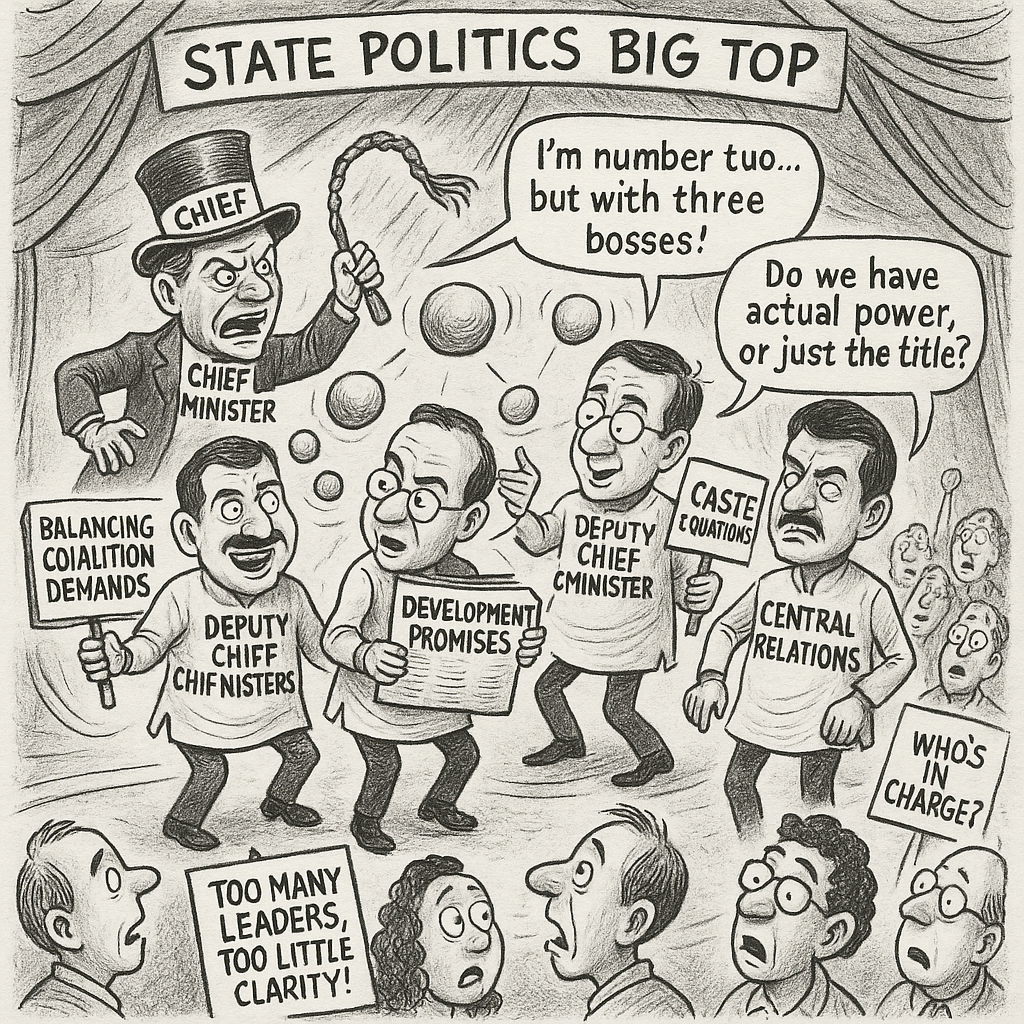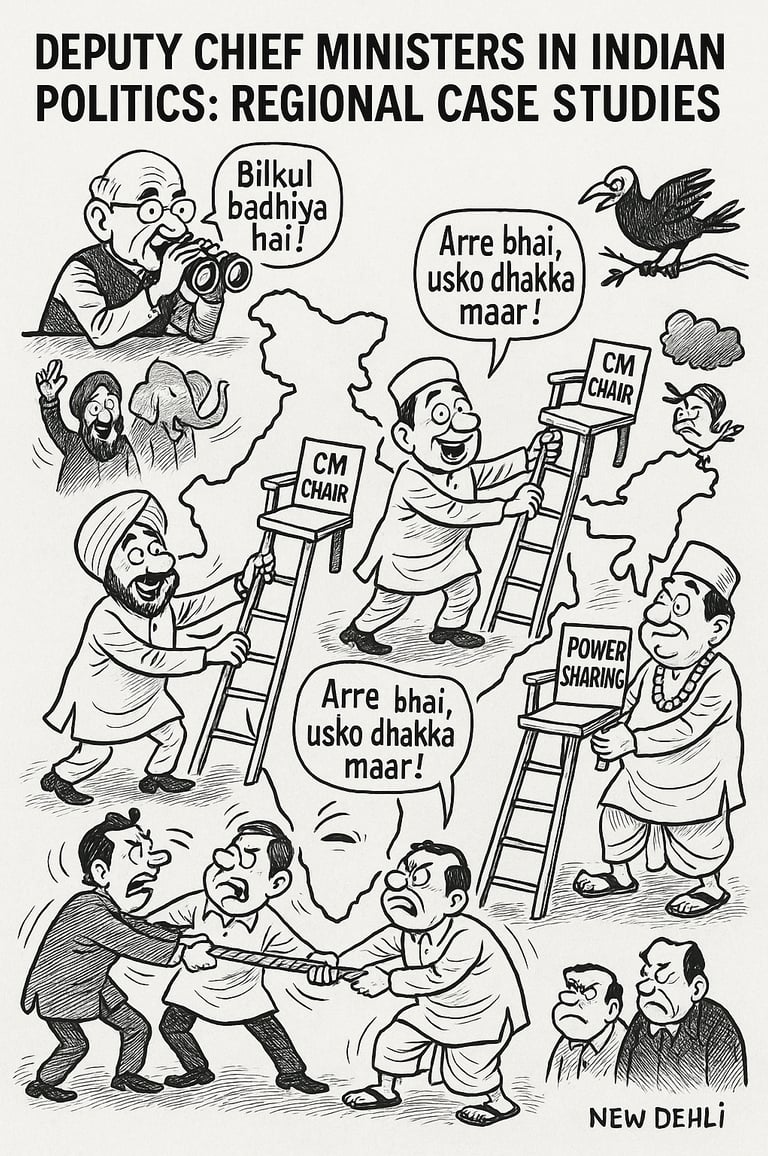Deputy Chief Ministers in Indian Politics: Regional Case Studies
Explore the role of Deputy Chief Ministers in Indian politics through regional case studies. Understand their influence on governance and party dynamics.
RESEARCH
Dr. Satyanandan Bhagat, Naman Joshi, Gaurav Upadhyay
5/23/20257 min read


Deputy Chief Ministers act as a balancer in India’s federal structure. The position of deputy chief minister enhances stability in political parties and in state administrative systems. Balveer Arora (1995) argues that Dy CMs are a result of India's quasi-federalism and work as "internal federal" checks and balances, particularly in state governments that are multi-party or heavily factional.
To counterbalance the Brahmin leadership, Govind Ballabh Pant appointed C.B. Gupta as Deputy Chief Minister in Uttar Pradesh (1951). The Congress party became divided into several groups following the Emergency and the general elections in 1977. After splitting from the Congress, which was led by Indira Gandhi, Sharad Pawar formed a coalition with other politicians who shared his views and ultimately joined the Congress (S). Nasikrao Tirpude was a Vidarbha-based Dalit leader. The Dalit community, which was growing more politically active, was placated by his appointment as Deputy Chief Minister. He maintained a balance of regional power between Vidarbha and Western Maharashtra, which is Pawar's base. The emergence of deputy chief ministers in Maharashtra is more a political move to satisfy the norm of social justice. Karpoori Thakur served as a minister and deputy chief minister of Bihar from 5 March 1967 to 31 January 1968, which demonstrated a move toward inclusive governance and the empowerment of underrepresented groups.
Chief Minister Harcharan Singh Brar faced criticism from within the party, leading to a two-month crisis. Rajinder Kaur Bhattal (1996) became Dy CM of Punjab after a split within Congress. As a member of the Janata Dal and Janata Dal (Secular), Siddaramaiah was Karnataka's deputy chief minister from 1996 to 1999 and again from 2004 to 2005.
In the 2004 Karnataka Legislative Assembly elections, no party secured a clear majority: Bharatiya Janata Party (BJP): 79 seats, Indian National Congress (INC): 65 seats, Janata Dal (Secular) [JD(S)]: 58 seats. The Congress and JD(S) forged a partnership to stop the BJP from taking power. Siddaramaiah of the JD(S) was named Finance Minister and Deputy Chief Minister, while Dharam Singh of the Congress was named Chief Minister.
O. Panneerselvam (OPS) often functioned in a role analogous to an "unofficial" Deputy Chief Minister under J. Jayalalithaa in Tamil Nadu (2001), especially during times she faced legal challenges. He held the official title of Chief Minister during these periods, his functional role was closer to that of a highly trusted deputy, overseeing operations in the leader's temporary absence, rather than a leader in his own right.
C. Damodar Raja Narasimha was appointed Deputy Chief Minister of Andhra Pradesh much later. He served in this role from June 10, 2011, until April 2014, during the tenure of Chief Minister N. Kiran Kumar Reddy. His appointment as Dy CM was indeed seen as significant representation for the Dalit community.
The combination of coalition politics, his established political power within the NCP, and his standing within the powerful Pawar family led to Ajit Pawar's (2010) selection as Dy CM. In coalition governments headed by Nitish Kumar of the Janata Dal (United) [JD(U)], Sushil Kumar Modi held the position of Deputy Chief Minister of Bihar twice: from 2005 to 2013 and from 2017 to 2020. Between 2009 and 2017, Parkash Singh Badal was Punjab's chief minister, while Sukhbir Singh Badal was his deputy. This family domination was strengthened by Sukhbir Singh Badal's ascent within the party and his appointment as Deputy Chief Minister.
Following the 2017 assembly elections, the Bharatiya Janata Party (BJP) made a calculated move by appointing Keshav Prasad Maurya and Dinesh Sharma as Deputy Chief Ministers under Yogi Adityanath in Uttar Pradesh. It was deliberate political action to strengthen the BJP's base of support in Uttar Pradesh and guarantee caste and regional representation.
A group of ten Congress MLAs defected to the ruling Bharatiya Janata Party (BJP) in July 2019 under the leadership of Chandrakant Kavlekar, who was the Goa assembly's Leader of Opposition at that time. His decision to resign from the Congress to the BJP, which helped to solidify and stabilise the ruling party's government in Goa, directly led to Chandrakant Kavlekar's appointment as Deputy Chief Minister.
The BJP's desire to establish a coalition government following the 2019 Haryana assembly elections led, directly to Dushyant Chautala's appointment, underscoring the intricacies of coalition governance in Haryana.
From 2014 until 2018, Mahmood Ali was Telangana's Deputy Chief Minister in the TRS (now BRS) government of K. Chandrashekar Rao (KCR). He remained in the state to speak for and represent the interests of the Muslim minority. To guarantee equitable representation of diverse social groups, Y.S. Jaganmohan Reddy selected five Deputy Chief Ministers in Andhra Pradesh in 2019. To strengthen his party's base of support, this calculated effort sought to embrace the SC, ST, BC, minority, and Kapu populations.
From December 2018 to July 2020, Sachin Pilot was Ashok Gehlot's deputy chief minister for Rajasthan. The Congress party's attempt to maintain power balance and recognize Pilot's important contribution to the party's win in the 2018 assembly elections led to his appointment. Later, an intra-party uprising resulted from disputes over policy and leadership.
During Pema Khandu's administration, Chowna Mein has been Arunachal Pradesh's Deputy Chief Minister. In particular, he has remained in that position since taking the oath of office on May 29, 2019. His political significance is demonstrated by his ongoing employment in this capacity, even after the 2024 elections.
Devendra Fadnavis became Deputy Chief Minister of Maharashtra under Eknath Shinde in 2022, following a major Shiv Sena split and BJP-Shiv Sena (Shinde faction) [which is now the actual Shiv Sena recognized by Election Commision of India] alliance. This appointment was largely due to political strategy, to ensure stability and maintain the alliance's power.
Brajesh Pathak became a Deputy Chief Minister of Uttar Pradesh on March 25, 2022. His appointment is interpreted as an attempt by the Bharatiya Janata Party (BJP) to provide the Brahmin group representation and preserve social harmony in the state. In March 2023, Sniawbhalang Dhar and Prestone Tynsong were named Deputy Chief Ministers of Meghalaya. To provide representation for various tribal groupings, this nomination emphasised the necessity for ethnic balance within the coalition administration.
In August 2022, Tejashwi Yadav was appointed Deputy Chief Minister once more. This came when Nitish Kumar, who needed the RJD's backing to establish a new government, broke with the BJP and reallied with them.
Following the Indian National Congress' victory in the state's legislative assembly elections, Mukesh Agnihotri was appointed as the first Deputy Chief Minister of Himachal Pradesh(2022). His selection recognizes his political expertise and seniority in the state.
After the 2023 state assembly elections, Vijay Sharma and Arun Sao were named Chhattisgarh's deputy chief ministers. This was a strategic move by the BJP to balance caste equations within the state. Together with the nomination of a tribal chief minister, Vishnu Deo Sai, the appointments served to represent both the OBC and Brahmin communities.
Following the elections in 2023, Rajendra Shukla and Jagdish Devda were appointed Deputy Chief Ministers of Madhya Pradesh. To guarantee that important regions were represented in the government, this was done to balance regional representation.
Following the BJP's victory in 2023, Diya Kumari and Prem Chand Bairwa were named Rajasthan's deputy chief ministers. With Bairwa representing Dalit interests and Kumari representing Rajputs, their appointments attempted to strike a balance in caste representation. Following the 2023 elections, Yanthungo Patton was kept in his position as Deputy Chief Minister of Nagaland. Within the coalition government, this was done to preserve regional balance and political stability.
Jishnu Dev Varma served as Tripura's Deputy Chief Minister until the 2023 elections. His continuation ensured tribal representation, vital for the BJP's strategy to maintain support in the Northeast's diverse political landscape.
On December 7, 2023, Mallu Bhatti Vikramarka was appointed Telangana's Deputy Chief Minister. His seniority within the Congress party and his noteworthy contributions-such as a well-known "padyatra" (foot march) that is said to have contributed to the Congress party's comeback in Telangana-have earned him the job.
On January 28, 2024, Samrat Choudhary was appointed Bihar's Deputy Chief Minister. When Nitish Kumar changed sides and joined the NDA after leaving the Mahagathbandhan, this happened. One of the BJP's strategic placements inside the new coalition administration is seen in his appointment and that of Vijay Sinha.
Under Chief Minister Mohan Charan Majhi, Kanak Vardhan Singh Deo, who was named Deputy Chief Minister on June 12, 2024, is in charge of the Agriculture and Energy portfolios. The first female Deputy Chief Minister of Odisha, Pravati Parida, was also appointed on June 12, 2024, and she is in charge of Mission Shakti, Women & Child Development, and Tourism.
On June 12, 2024, Konidela Pawan Kalyan was appointed Andhra Pradesh’s Deputy Chief Minister after his Janasena Party won a majority in the Andhra Pradesh legislative assembly elections. His appointment reflects the coalition’s success and his party’s crucial role in it. His tenure aims to ensure political stability and the continuation of government functions.
In order to maintain regional balance, Surinder Kumar Choudhary was sworn in as Deputy Chief Minister on October 16, 2024, to represent the JKNC in the coalition administration headed by Omar Abdullah. On September 28, 2024, Udhayanidhi Stalin was appointed Tamil Nadu's Deputy Chief Minister. This action, which reflects his growing political influence and an attempt to create a succession plan within the Dravida Munnetra Kazhagam (DMK) party, is primarily viewed as a progression within the party.
On December 5, 2024, Eknath Shinde was appointed Maharashtra's Deputy Chief Minister. This appointment was a component of a political realignment that sought greater representation and stability in the government after the state assembly elections. Ajith Pawar joined the Eknath Shinde-led government, taking the oath on July 2nd , 2023, and then again on December 5th , 2024.
DyCMsIndia #DeputyCMs #IndianDyCMs #IndianGovernance #IndianPolitics #PoliticalCaseStudies #GovernanceIndia #FederalismIndia
NOTE- This article is adapted from the published research paper titled "Balancing Mandates: Coalition Politics and the Rise of Deputy Chief Ministers in States of India," which appeared in "Anukriti: An International Peer-Reviewed Refereed Research Journal" (Volume 15, Number 2, February 2025).


